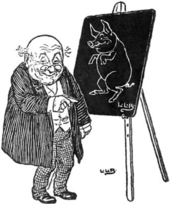Leonard Leslie Brooke
Leonard Leslie Brooke (born September 24, 1862 in Birkenhead , Merseyside , † May 1, 1940 in Hampstead , London ), L. Leslie Brooke for short , was a British draftsman , painter and author . He gained fame as an illustrator of numerous children's and picture books .
Life
Leonard Leslie Brooke attended from 1880 Birkenhead Art School and from 1882 in London , the St John's Wood Art School . From 1884 to 1888 he was a student at the Royal Academy of Arts . In 1888 he received the Academy's Armitage Medal . After graduating, he began his career as a watercolor and portrait painter . In 1891 he succeeded Walter Crane as an illustrator of the Victorian children's novels by Mary Louisa Molesworth and changed the subject. During a trip to Italy, the artist fell ill and remained permanently deaf . On June 28, 1894, he married Sybil Diana Brooke, the daughter of his cousin Reverend Stopford Brooke. His eldest son served in the Royal Air Force and died in World War I in 1918 . His younger son Henry , like his son Peter, was a politician in the Conservative Party .
1897 of published Andrew Lang published Nursery Rhyme Book . From the turn of the century to 1916, at the height of his productivity, Brooke illustrated numerous children's fairy tales and rhymes , including nonsense poems by Edward Lear . His first self-written and illustrated book, Johnny Crow's Garden , was published in 1903 and was dedicated to his late father and sons. He wrote two sequels ( Johnny Crow's Party and Johnny Crow's New Garden ) in 1907 and 1935, the latter in honor of his grandson. After living in Oxford for a period , Brooke died in London in 1940 at the age of 77.
plant
At the beginning of his career, Brooke, who always signed his works with his initials "LLB", tried successfully as a portrait painter . However, he became famous for his child-friendly black-and-white and color illustrations, often with watercolors . In his most famous work, Johnny Crow's Garden and its two successors, Brooke tells in rhymes of a lovable crow that invites her animal friends to her garden. He did not portray the animals in the style of an animal painter , but rather endowed them with plenty of anthropogenic properties as a friendly observer of his fellow human beings. Special praise goes to the reception for the emotional facial expressions as well as the body language of his animal figures, which are nevertheless accurately represented. Brooke's beginnings as a portrait painter are reflected in the faces of his people.
Brooke drew inspiration for his stories from his sons as well as from his own childhood. The artist's character and personality as well as his love for animals and enthusiasm for English gardening are reflected in his careful and imaginative work. His slightly absurd humor brought him comparisons with Edward Lear and Lewis Carroll , as an illustrator he is now mentioned in a series with Walter Crane , Beatrix Potter , Kate Greenaway and Randolph Caldecott . In 1960, Johnny Crow's Garden was posthumously awarded the Lewis Carroll Shelf Award .
Works (selection)
Text and illustrations
- 1903: Johnny Crow's Garden
- 1907: Johnny Crow's Party
- 1935: Johnny Crow's New Garden
Illustrations
- from 1891: novels by Mary Louisa Molesworth
- 1897: The Nursery Rhyme Book (Ed. Andrew Lang )
- 1904: The Story of the Three Little Pigs
- 1905: The Golden Goose Book
- 1911: The Tailor and the Crow
- 1922: Ring O'Roses: A Nursery Rhyme Picture Book
- 1922: Little Bo-Peep: A Nursery Rhyme Picture Book
- 1930: A Roundabout Turn (Author Robert H. Charles)
- 1931: The Truth About Old King Cole and Other Very Naural Histories (author GF Hill)
gallery
Johnny Crow's Garden (1903)
Little Bo-Peep (1922)
literature
- Hajo Düchting : Brooke, Leonard Leslie . In: General Artist Lexicon . The visual artists of all times and peoples (AKL). Volume 14, Saur, Munich a. a. 1996, ISBN 3-598-22754-X , p. 373.
- Anita Silvey (Ed.): Children's Books and Their Creators . Houghton Mifflin Harcourt , Boston 1995, ISBN 0-395-65380-0 , p. 89. (Google preview ; English).
Web links
- Literature by and about Leonard Leslie Brooke in the WorldCat bibliographic database
- Works by L. Leslie Brooke on Project Gutenberg
Individual evidence
- ↑ a b c d Anita Silvey (Ed.): Children's Books and Their Creators . Houghton Mifflin Harcourt , Boston 1995, ISBN 0-395-65380-0 , p. 89. (Google preview ; English).
- ↑ a b c d Leonard Leslie Brooke. Holmes à Court, April 11, 2016, accessed May 5, 2018 .
| personal data | |
|---|---|
| SURNAME | Brooke, Leonard Leslie |
| ALTERNATIVE NAMES | Brooke, L. Leslie |
| BRIEF DESCRIPTION | British draftsman, painter and author |
| DATE OF BIRTH | September 24, 1862 |
| PLACE OF BIRTH | Birkenhead , Merseyside |
| DATE OF DEATH | May 1, 1940 |
| Place of death | Hampstead , London |













